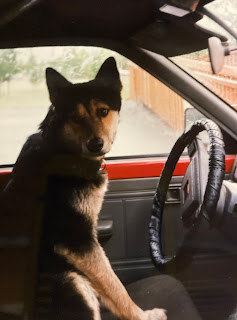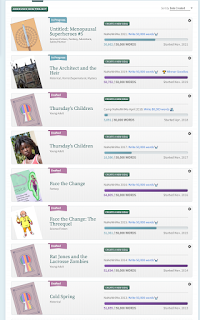I started a new job in May. Not just a new job, a complete change in career, moving from classroom teaching to working mostly from home as a content strategist for a big financial company.
Of course, that set everything else in my life topsy-turvy, too--from what time I get up in the morning, to when I do my creative writing, to what I eat for lunch, when and how I exercise, and of course, how much and what I read.
Looks like I haven't written about my reading life since June! Unusual for me--since I usually do a monthly round-up of what I've been reading.
As of today, I'm 2 books behind on my reading challenge (I always make a goal of 52 books a year, one per week). Not too bad considering all the changes in my life.
 |
| Screenshot from my Goodreads Reading Challenge 2022 |
I'm still reading primarily on audiobook (either on Audible or Chirp), on Kindle, or on audiobook with reference to the ebook edition, depending on whether I expect to want to take notes. Paper books continue to be difficult for me because of arthritis and eyesight. Another reason to love being a 21st century girl--my limitations don't have to constrain my reading.
For a little while there, I was reading GIANT books. Partly, this is the fault of my First Monday Classics Book Club, which chose
David Copperfield for August and
Anna Karenina for October. We tend to do that--if the first Monday is a holiday, we don't meet that month, so this year we didn't meet on Independence Day or Labor Day. When we've got 2 months between meetings, we pick a tome. Each of these took me fully a month to read.
Those three tomes were probably why my book count fell behind, but I'm really glad I read all three of them.
The Weight of Ink was a work of historical fiction that pulled me into a world I had never really read about before, the immigration of Jews from Portugal to Amsterdam to London during the Inquisition, with fascinating main characters in both the past and present storylines.
David Copperfield was a sweeping story of growing up poor and making something of one's self and
Anna Karenina was a sweeping story of growing up rich and losing it all--proof that getting what you want isn't the same thing and finding happiness.
The Ballad of Black Tom had been on my TBR for quite some time, having come highly recommended by several friends who also enjoy horror and dark fiction with a Lovecraftian bent. It was excellent. And I picked up
The Beautiful Ones because I LOVED
Mexican Gothic by the same author. It proved similarly atmospheric and lyrical, so I'll definitely be seeking out more by Silvia Garcia Moreno.
I read more nonfiction than usual this fall. My daughter had read
Rage Becomes Her by Soroya Chemaly as part of a summer course, and recommended it. Reading it led me to
A Girl's Guide to Joining the Resistance by Emma Rose Gray. Both books speak to the rage that has taken over a lot of women in the past decade or so, as certain elements of our society have worked to squash the gains we have seen in civil and legal rights since my grandmother's day. If you're looking to channel the energy of your anger in helpful directions, you can find some ideas in these two books.
Also in nonfiction, I read
The War for Kindness by Jamil Zaki. It's part of work-related book club I'm participating in (I know; I have a book club problem--I just love the experience of talking about books with other people who've read the same books SO MUCH). I also started
Atomic Habits and plan to pick up
How to Make Sense of Any Mess: Information Architecture for Everyone and expect to finish those before the year ends
. All three of these are part of my attempt to connect with my new colleagues and understand corporate thinking. Even if I find some of the thinking simplistic, I do find that they spark good conversations.
I think I'm a hard sell when it comes to "self help" and related genres--my skepticism is sparked when the solutions are too easy, and I'm over fifty--so some of the ideas are old hat for me. Hardly as eye-opening as they think they are.
Beloved by Toni Morrison was the November choice for First Monday Classics, which meant I was reading it in October. Very thematic. This was my third or fourth time reading the book and it's still harrowing. Truly one of the best ghost stories I've ever read. It was made even better this time as my audiobook was read by Morrison herself.
I also was a guest at
Multiverse in Atlanta, Georgia this October--with guest of honor Mary Robinette Kowal.
She described her newest release,
The Spare Man, as "the Thin Man in space" and I was sold since I adore Nick and Nora Charles.
I bought it before I left the con and started listening to it on the way home. Kowal also narrates her own work, and does beautiful voicework, so it was a real treat.
Right as I finished that book was when I realized that I was behind on my reading challenge and started choosing short works that were already in my Audible library. So in short order (roughly one book per day), I read:
All of them were well worth reading and left me thinking in different ways. I probably enjoyed Remote Control the most, and will probably spend the most time pondering Convenience Store Woman.
So, that's where my reading time has gone since summer. How about yours? Anything I should add to my endless TBR? I'd love to hear about it in the comments!


















